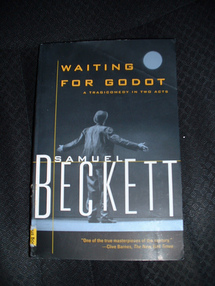
Friday night Corky and I saw the Marin Theater Company’s production of this play. This time the play didn’t speak to me. The play was essentially the same as the Ireland’s Gate Theatre Waiting for Godot at Cal Performances in 2006. I loved it in ’06. Same barren stage, leafless tree in the first act, scattering of hopeful leaves in the second, same moon zipping into the sky as day ends and same no-show Godot.
What didn’t work on stage I leave to critics to explain. What clearly no longer speaks to me is two acts of disillusionment and hopelessness. Vladimir and Estragon, (Didi and Gogo), still expect an outside force, “Godot,” to give meaning to their sad and empty lives, and this isn’t going to happen. Meanwhile, they try to pass the time and “hold the terrible silence at bay” until Godot arrives.
The play reflects a meaningless world in two acts performed on an almost empty stage and may only be performed by a male cast. The play’s director said so when I asked him if Beckett had so stipulated.
When I first fell in love with the play, its unending dissatisfaction and emptiness suited me. Like Beckett after World War II, I too allowed that joy and beauty were absent in the world. Certainly, Beckett’s Europe had better reason than I to adopt a posture of weariness, but I took to absurdity and the glorification of incomprehension as expressions of my human condition.
But this is not a review of the play per se. Not a critic, I generally rely on my right leg as an arbiter of engagement. It never shakes at the opera. It was still during Saturday’s ballet performance. But Friday night, I knew from the leg’s restless shifting and shaking that this theater experience wasn’t working for me. I lay the right leg over the empty chair next to me, but that was a temporary fix. Crossing it over the left didn’t help nor did crossing the left over the right. Because I was holding my former girlfriend Corky’s hand, and it rested on my left knee, I was aware that my discomfort might distract her.
So what in me has changed so much that this performance of Godot left me unmoved, except for the restless shifting of my right leg? Beckett’s tragicomedy now feels more unhappy than comedic. Although I used to laugh, it was probably not at vaudevillian turns or non sequiturs as much as at the confusion I sensed in other members of the audience. On opening night in Marin, the director said 160 people came to see the play. At intermission, 37 had gone home. By Friday night when Corky and I saw the play the house was sparsely filled and 37 other theatergoers probably left at intermission. I might have gone too, but I came with Corky and she had not seen the play.
In a Sunday morning conversation with my oldest son who, like me, once flirted with the void, I said I had little interest in Beckett’s tragicomedy when I saw it Friday night in Marin. I wondered if I hadn’t outgrown living without optimism and was now finding a play bereft of connection an uncompelling evening out.
Having given some thought to why I was not entertained by the human suffering I saw on stage, I conclude that watching Vladimir and Estragon struggle with uncertainty and disappointment is more painful than amusing. My own grief is not something I can laugh off. To be without compassion for the human condition and to be without compassion for one’s own grief is no laughing matter.
 RSS Feed
RSS Feed